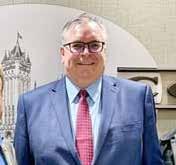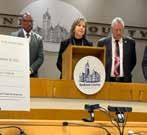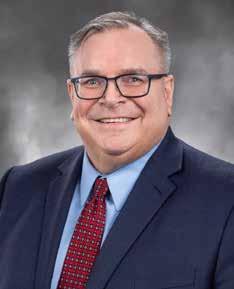










By Ben Wick Stream Publisher Washington State
Representative Mike Volz, from the 6th Legislative District, which includes the cities of Airway Heights, Medical Lake, and northwest Spokane County, was appointed by the Spokane County Commissioners on February 3rd to serve as the Spokane County Treasurer. Volz will fill the remainder of the term vacated
Congress representing the 5th Congressional District after Congresswoman Cathy McMorris Rodgers retirement.
Volz was born in Walla Walla Washington and came to Spokane when his parents moved here in 1974.
“We lived on the north side, and I remember climbing up on the roof to watch the fireworks from Expo” remembered Volz.
In his sophomore year Volz transferred to Ritzville High School when his parents became teachers in the district.
“My dad became a teacher there for one year, before going to work
teacher, when to work for Ritzville but later transferred to West Valley School District to become a middle school teacher before retiring.
Volz met his future wife, Diane, while at Ritzville. “We went to the Homecoming Dance in October of 1980” said Volz.
After graduation, Volz attended Eastern Washington University for a year before joining the Army. Pursuing a career in law enforcement, he served in the Military Police (MP) and was stationed for two years in west Germany followed by a year at Fort Bragg North Carolina before leaving the service. “I thought I

Contributed photo
Pictured left to right, Spokane County Commissioner Mary Kuney, Josh Kerns, 6th District State Representative Mike Volz, and Spokane County Commissioner Al French. Spokane County Commissioners appoint Mike Volz to be the new Spokane County Treasurer on February 3rd 2025.
In 1989, Volz married his high school sweetheart Diane and began working at a local freight dock then later for a private security firm while continuing his education at Eastern Washington University. In 1995, he earned bachelor’s degrees in accounting and finance. At the age of 35, he passed the CPA exam and became a certified public accountant. Volz continued his education at Gonzaga University ultimately receiving a Masters in Business Administration.
As he finished his education at Eastern, Mike and Diane started their family and have three kids; James who is 30 years old and is currently in his medical residency training in Pittsburg; Kristina who is 27 years old, married into a farming family in St John Washington; and Alisa who is 23 years old and is in communications in Pullman Washington.
In 1994 Mike began exploring his interest in politics. “I got involved in the Republican Party when we voted out the Speaker of the House [Foley]” said Volz.
Volz’s involvement in the Republican party included service as the Spokane County State Committeeman and an unsuccessful run for County Auditor before running for State Representative in the Washington State 6th Legislative District following Representative Kevin Parkers retirement in 2016. He has been serving in the Legislature ever since.
“I enjoy meeting, interacting with people and working on how we can make things better or maybe a little less worse depending on how you look at it” said Volz.
When talking about the
See VOLZ, Page 4




Continued from page 2


accomplishments he is most proud of Volz highlights two pieces of legislation. The first being House Bill 1410 which Volz sponsored in 2021 that ultimately was approved and signed into law, which eliminated the penalties for delinquent property taxes and reduced the interest from 12% to 9% beginning in 2023.
The second being House Bill 2014 which Volz sponsored in 2024 which aligned the definitions of military service qualifications for medical benefits to match that of the federal government. According to the Attorney General this allowed 35,000 Washington veterans who already qualified for federal benefits to also qualify for state benefits.
In his professional career, Volz was hired as an Accountant in the Spokane County Treasurers Office in 1999, leaving to work for Spokane Transit in 2006 and then returning to the Spokane County Treasurers Office in 2010 when then Spokane County Treasurer Rob Chase was elected and recruited him back to the office.
Within the office Volz worked his way up to Chief Deputy Treasurer and was appointed as Interim Treasurer by the County Commissioners earlier this year.
Volz was nominated by the Spokane County Republican Party along with John Christina and Robert Miceli and was appointed at the official Spokane County Treasurer beginning February 3rd.
“At first I was hesitant at applying, as long as we got someone good” said Volz, “Then I decided to throw my name in” citing the technical nature of the office.
Volz’s appointment to Spokane County Treasurers Office is valid until the next election cycle and will appear on the November 2025 ballot. That election will determine who will fill out the remainder of the open term which expires at the end of 2026. We will again see the Treasurers race on the November 2026 ballot for the next four year term.
In Washington State, County Elected Officials are allowed to simultaneously hold a state legislative office and
Representative Volz has chosen to continue his responsibilities in the state legislature for the remainder of his current term, which expires at the end of 2026, while taking on the added role of Spokane County Treasurer. “Being in the middle of the legislative session, it would be hard to have someone come up to speed in time to represent the district effectively” says Volz.
When asked about his goals for the Spokane County Treasurers office, Volz highlights three main areas that need attention.
• Completing the final implementation phase of the county’s new financial management software.
• Working with the County Assessor to replace the dated tax software system as the current software has been utilized for more than 28 years, is at the end of its available life, and is being phased out of support by the manufacturer.
• Establishing a continuity plan for expected staff retirements.
“80% of the senior leadership of the department are at retirement age, we need to have a continuity plan” said Volz.

By Matthew Stephens Stream contributor
The Airway Heights City Council held a study session on Feb. 10, 2025, with a primary focus on code compliance following a detailed presentation by the city’s new compliance officer. The presentation highlighted ongoing compliance issues and introduced new enforcement strategies aimed at improving oversight and coordination across city departments.
Principal Planner Heather Trautman said the new compliance officer has been wonderful to work with during the push to get the city’s backlog caught up and nuisance properties back up to code.
The newly established code compliance position is tasked with collaborating across multiple departments, including public works, building and planning departments, as well as police and fire when necessary. The presentation to the council revealed that some code violations have been lingering in the community for as long as two to three years.
One of the major issues identified was unpermitted construction. A notable case involved a tenant in an Airway Heights duplex who significantly expanded a doorway from four feet to 12 feet, and redid the electrical work themselves without obtaining proper permits. The issue was brought to the city's attention by a concerned neighbor worried about the structural integrity of their side of the duplex.
Zoning violations were also a key concern. Some residents and businesses were found to be improperly combining residential and commercial uses. Additionally, some projects were left incomplete without undergoing required final inspections, adding to a backlog of code violations. The compliance officer warned that some businesses might be operating without inspections, posing safety hazards to both the public and first responders
in the event of a structural failure.
Council members questioned how violations had persisted for years without enforcement. The compliance officer cited a lack of proactive measures, poor coordination between inspectors, and insufficient penalties as primary factors. In response, the city is introducing a revised penalty structure with higher fines for both commercial and residential violations. However, the department aims to encourage voluntary compliance before issuing fines.
Under the new system, violators will receive an initial 30-day notice to address issues. If no action is taken, a second notice will follow. The city is willing to work with individuals through voluntary compliance agreements, which can extend deadlines based on financial or weather-related constraints.
The presentation also highlighted concerns over excessive vehicle storage on private properties. At two different locations, there were reports of between 350 to 450 vehicles stored at one time. One property, a towing yard, has entered into a voluntary agreement with the city and is actively removing vehicles. However, another property owner was found to be illegally operating a commercial vehicle storage site. Cleanup efforts at this site have been slow due to inclement weather, but the city continues to monitor progress.
The compliance officer emphasized the need for better communication and proactive enforcement. Many property owners, he said, are unaware of permit requirements. In one instance, a property owner purchased a pre-built garage under the false impression that permits were unnecessary. Similarly, an individual hired a contractor to install a driveway without being informed that permits were

required.
To address these challenges, the department plans to crack down on unlicensed businesses and unpermitted construction. Regular inspections and follow-ups will be implemented to ensure compliance.
Additionally, the presentation revealed troubling conditions at a property described as a “compound.” Comprising two parcels, the site houses approximately 20 individuals in makeshift wooden structures. Statistics showed that emergency services responded to around 30 calls at the location in 2024, including multiple drug overdoses. Photos presented to the council displayed large amounts of trash and debris, with cleanup costs estimated at $500 per day, potentially reaching $100,000.
Mayor Larry Bowman announced during the meeting that he intends to run for a state legislature seat, so this term will be his last in city council.
In funding news, the city has requested $380,000 in legislative funding for design projects, with strong backing from three state
delegates. Officials anticipate a positive outcome.
Fire Chief Mitch Metzger provided updates on the city’s new fire engine, which is nearing service. The vehicle required additional work due to an incident in which a truck with a trailer backed into its front bumper, necessitating repairs and the replacement of emergency sirens. Final modifications are being completed in Spokane Valley, and a walk-in ceremony will be held in the near future.
In a move to support neighboring communities, the council moved forward a request to donate the city’s old fire engine to Adams County Fire District 7.
The rural district, which relies solely on volunteer firefighters, currently operates with repurposed farm equipment. The donated engine will be its only fire apparatus with a functioning pump, significantly improving firefighting capabilities in the area.
The Airway Heights City Council will continue efforts to enhance code enforcement, improve city infrastructure, and support regional emergency response efforts in the coming months.

By Ben Wick Stream Publisher
There are multiple ways to engage in the Legislative Process in Washington State. The primary way is to engage with your elected officials directly. This way you can share your thoughts and beliefs with your legislators to help influence their position or vote on the issue. Another way is to comment or testify on the proposals / bills directly.
The Identifying your Legislators
Following a districting or redistricting process that occurs every ten years, after each census, that breaks the state into 49, approximately equal by population, legislative districts. Each district has two state representatives and one senator. These representatives are the districts voice in the state legislature.
6th legislative district incorporating the Cities of Medical Lake and Airway Heights then extending north to the Spokane County boarder. Those living south of the city of Medical Lake, around Silverlake, or within the City of Cheney and south Spokane County are in the 9th Legislative District. The 9th Legislative District is a larger district that also wraps around the south side of Spokane County and includes areas such as Liberty Lake. As well as everything west of Spokane County from the river down to Oregon picking up the Cities of Pullman, Pomeroy, Ritzville, Lind, and Odessa.
Once you have identified the legislative district you are in, connect with your legislators to get help with state issues, stay up-to-date with happenings in Olympia by subscribing to their newsletters, or reach out and share your opinions on the pending legislative actions / bills.
The 6th Legislative District legislators are:

Representative Jenny Graham, Republican, jenny.graham@leg. wa.gov 360-786-7962 https://leg. wa.gov/legislators/member/29093

Representative Mike Volz, Republican, mike.volz@leg.wa.gov 360-786-7922
https://leg.wa.gov/legislators/ member/26170

Senator Jeff Holy, Republican, jeff.holy@leg.wa.gov 360-786-7922
https://leg.wa.gov/legislators/ member/17223
The 9th Legislative District legislators are:

Representative Mary Dye, Republican, mary.dye@leg.wa.gov 360-786-7942 https://leg.wa.gov/ legislators/member/21490

Representative Joe Schmick, Republican, joe.schmick@leg. wa.gov 360-786-7844 https://leg. wa.gov/legislators/member/13209

Senator Mark Schoesler, Republican, mark.schoesler@leg. wa.gov 360-786-7620 https://leg. wa.gov/legislators/member/652
Another great way to engage with the state legislative process is by sharing your position on bills or legislative changes being considered. Anyone can sign in or indicate that they are in favor (pro) for or against (con) a legislative proposal or bill while it is having a hearing in a legislative committee. Access https://leg.wa.gov/billsmeetings-and-session/ to learn more about finding the current bills and the upcoming legislative committee meeting schedule to know which ones are going to have a hearing this week so that you can share your thoughts.
While the state legislature is considering over 1,000 different bills there are some key dates that affect their consideration. Each bill is referred to go through at least one committee related to its topic. It is during this stage that the legislature holds the public hearing and has an opportunity to hear from the public any comments. While not all bills are allowed to have a hearing, all bills are required to pass out of their committees on or before the 40th day of the legislative session which is February 21st 2025. If a bill doesn’t get voted out of the committee before then it will no longer be considered during this legislative session (unless it is deemed necessary to implement the budget). If the bill has an impact on the operating budget, after it passes out of its policy committee it must go through the finance or fiscal committee. Bills are required to pass out of the fiscal committee by the 47th day of session which is February 28th 2025 to still be considered.
After the committee reviews and approvals, bills must pass their house of origin meaning that it must be approved by the majority of the representatives of the chamber it was submitted in (i.e. either the House or the Senate) by 5pm on the 59th day of session or March 12th in order to continue to be considered.
After that the process starts over in the opposite house, if the House approved the original bill then it would begin its process in the Senate by first going through its committees (on or before April 2nd, then fiscal committee by April 8th, and to the floor for a vote by April 16th unless it is considered necessary to implement the budget then it is exempt from all cutoff timelines.
The official end of the legislative session per the state constitution is April 27th. After which the Governor has 5 days to approve or veto any approved legislation.
By Ben Wick Stream Publisher
While the legislature is considering over 1,000 different bills currently here are a couple of them that rise to the top that you might want to weigh in on. Note: the legislative session is active and these proposals are subject to change so please check the legislative websites or your legislators for the most recent updates on them.
Unlike most personal budgets the state has three separate budgets (Operating, Transportation, and Capital) which are all biennial or two year budgets. The Operating Budget which is the budget that contains the day to day operations of most state agencies, colleges and universities, and public schools. While it is too soon to see any legislative proposals around the budget, based upon financial projections from the Washington State Office of Financial Management (OFM), the state will be facing $10 to $12 Billion more expenses than revenue for the 2025 to 2027 budget. This has dominated most discussions around the capital as to how the state legislature is going to address this projection. The governor has called for $3 Billion in spending reductions some legislators are talking about ways to get more revenue which will come from increased taxes.
The State budget that funds the construction, maintenance and operation of the states transportation infrastructure. This budget is also projected to have more expenses planned for 2025 to 2027 than the projected revenue. The methods of balancing this budget are by delaying construction projects into the future thereby reducing the expenses in the current budget or by raising revenues.
For our region the possibility of delaying construction projects is concerning when thinking about the completion of the North Spokane Corridor which has funding expected to be included in the upcoming budget. While this isn’t
the only mega project in the budget forecast it is one that is up for consideration for the legislators as they craft the transportation budget.
Some legislators are interested in pursuing a revenue option. House Bill 1921 a bill that would implement a road usage charge that would augment the reduced revenues being seen by the transportation budgets primary revenue source (the gas tax). According to a press release about the legislation, it proposes a road usage charge of 2.6 cents per mile, which would be adjusted periodically to match the gas tax revenue, and would involve annual odometer reporting, with self-reporting being phased in starting in 2026. The proposed roll out would be in the following phases:
• Phase 1 (2027-2029): Voluntary for EV and hybrid drivers (registration fees waived).
• Phase 2 (2029-2031): Mandatory for EVs/hybrids;
voluntary for fuel-efficient gas vehicles (20+ mpg).
• Phase 3 (2031-2035):
Mandatory for all gas vehicles with 20+ mpg. Beginning July 2031 – 2035, fuel-efficient cars will be phased in from most to least fuel-efficient
HB 1764 is a proposal to increase the state minimum wage annually from $17.50 in 2026 to $25 in year 2031.
HB 1380 is a proposal that requires any city or town, or county laws that regulate the acts of sitting, lying, sleeping, or keeping warm and dry outdoors on public property that is open to the public be objectively reasonable as to time, place, and manner.
SB 5285 Grants authority to cities and counties to impose a 0.10 percent sales and use tax, credited against the state sales and use tax, for employing additional commissioned law enforcement officers.

Curtesy of https://app.leg.wa.gov/district finder/ Washington State Legislative District Map, showing the boundary between the 6th Legislative District shown in the bluish color to the North and the 9th Legislative District represented in the orange-ish color to the South.
Minimum wage increase: Senate Bill 5578 and House Bill 1764 sponsored by Sen. Rebecca Saldaña, D-Seattle, and Rep. Sharlett Mena, D-Tacoma, would raise the state’s minimum wage to $25 an hour by 2031. The bills would also mandate employers provide paid vacation and bereavement time. The bill would require a full-time employee to receive at least three weeks of paid vacation a year, with employees eligible to take vacation after 90 days of employment. A higher minimum would also raise the salary threshold for overtimeexempt employees, requiring many more employers to start paying overtime. This legislation would add significant strain on Washington employers who already pay the nation’s highest minimum wage and other costs.
Property tax revenue growth: A proposal to triple how much local governments can increase property tax revenue annually has returned this session. Sponsored by Rep. Gerry Pollet, D-Seattle, House Bill 1334 would eliminate a voterimposed 1% cap on annual property tax growth and replace it with a 3% limit. AWB opposes this bill since it would increase homeownership costs and make housing more expensive.
Registered apprenticeships: House Bill 1777, sponsored by Rep. Suzanne Schmidt, R-Spokane Valley, expedites consideration of apprenticeship programs already approved by the federal government, significantly expanding access to apprenticeship for all employers in Washington. AWB will testify in support.
Career opportunities for students: Students engaged in career and technical education programs face barriers to employment due to their age. House Bills 1414 and 1722, both sponsored by Rep. April Connors, R-Kennewick, would allow students to receive their credentials and begin their careers before their
See AWB, Page 14
By Nina Culver Stream contributor
The U.S. Department of Housing and Urban Development recently announced an additional $44 million in disaster relief funding for those impacted by the Gray Fire in Medical Lake and the Oregon Road Fire near Elk in 2023 as some families still struggle to rebuild.
The funding is a Community Development Block Grant-Disaster Recovery grant and this is only the second time such a grant has been awarded in Washington State, said HUD Northwest Regional Administrator Andrew Loftin. The wind-driven fires burned thousands of acres and razed hundreds of homes. “We know how difficult it is to rebuild after that,” Loftin said. “This represents a promise, a promise that HUD is here with you as you rebuild.”
The funding was announced in a January press conference attended by Spokane County commissioners and Medical Lake Mayor Teri Cooper, who is also president of the Spokane Regional Long Term Recovery Group dedicated to rebuilding both communities. The grant will be overseen by the Commissioners.
Commissioner Al French thanked Senators Patty Murry and Maria Cantwell for their push to get the funding approved as part of the Disaster Relief Supplemental Appropriations Act of 2025, which was approved by Congress in December. Both have been working tirelessly to get funding for the area in the wake of the fires, he said.
“It devastated the communities of Medical Lake and Elk,” French said. “Today we have a long way to go. We have families who are still rebuilding.”
Murray was chair of the Senate Appropriations Committee at the time the bill was passed. “I promised after the fires struck that I would stay in close touch with communities
on the ground and make sure they had the federal support they needed to recover, for as long as it took to rebuild,” Murray said in a statement. “This funding will make sure that important recovery work continues.”
“The Oregon and Gray Road fires were some of the most destructive in state history, burning more than 20,000 acres and destroying public infrastructure and hundreds of Spokane area homes,” Cantwell said in a statement. “That is why we fought so hard to ensure the inclusion of the disaster supplemental in December’s temporary funding bill.”
French cautioned that it may take months to develop a spending plan for the funding. The County is required to do a fresh needs assessment, get public input and develop an action plan. After allowing 30 days for public comment on the plan, it must then be sent to HUD for review and approval. “We know, like the recovery process, it won’t be quick,” he said.
“We do know there is a process we have to follow,” said Commissioner Josh Kerns. “We will
move as swiftly as we can.”
The primary focus of the funding is to help those who did not have homeowners insurance or were underinsured. Quite a few impacted families had insurance, but it was based on home values that were not updated and insurance did not pay for the full cost to replace the home.
Some families are still living in RV’s full time, said Medical Lake Mayor Teri Cooper. Previous state and federal funding has been used to winterize those RV’s and, in some cases, construct a roof over them to protect them from the elements. Previous funding has also paid for building kits to build eight 800-square foot homes for those without insurance, two in Medical Lake and six in Elk. Those houses are now ready for finish work, Cooper said.
Community support and donations during the rebuilding process has been invaluable, Cooper said. “A lot of work has happened,” she said. “Thank you for all the money you gave. It’s going to work.”
Part of the new needs assessment will be to determine how many families are still in need of housing
replacement, Cooper said. That includes the 35 households living in RVs and Cooper said she knows of at least a dozen families who have been unable to rebuild on their own. “This next round will reassess all those people,” she said. “We need to do a full deep dive again on the needs.”
French said it’s too early to say what the $44 million might be spent on exactly, particularly before the public has given input. The funding can be used to replace damaged affordable housing, repair and improve public infrastructure such as roads and utilities, support small businesses and implement mitigation efforts to reduce risks in future disasters.
The funding will provide an important boost to the ongoing work to return the Medical Lake and Elk communities to normal, Cooper said. “I think this $44 million is going to go a long way,” she said.
Kerns said the funding will help local families who are still struggling to piece their lives back together. “This is tremendous news,” he said. “It’s almost impossible to explain the devastation these fires caused.”

By Matthew Stephens Stream contributor
The City Council of Medical Lake unanimously moved forward with the purchase of a historically significant property, sparking mixed reactions among residents. During its February 4 meeting, the Medical Lake City Council entered an executive session to finalize discussions on acquiring the property through Resolution #25-734. The site, located at 316 W. Brooks Rd., includes the city’s old train station and was listed on Zillow for $380,000. However, according to comments made by resident Tammy Roberson, the city was looking to secure the purchase for $350,000.
Jaymz Ehresman, in a social media post, stated that the purchase was made to preserve a vital piece of Medical Lake’s history. The city echoed this sentiment in a Facebook post on February 7, stating that the depot is regarded as the second most significant historic building in the city and that the purchase aligns with efforts to protect its heritage. Others worry that this will be another property that will go unmaintained.
According to David Rogers the city doesn’t put much maintenance into the current historic sites. “Read the history of this lil town, the house was the main rail station, 3 saloons,7 general stores, 4 resorts, 4 bath houses, the Hallet House, and a trolley that went all the way to Spokane,” Rogers commented. What's left, just names of things. The Hallet House and its history and the architecture are amazing, but it looks like a run-down castle. But I think them swooping in Now to get it, is quite shady.”
Despite the city’s intentions, concerns have emerged among residents regarding the process of the purchase. Some claim the transaction is being facilitated through a buyer
brokerage firm rather than directly from the property’s owning family. Others have questioned the zoning classification of the property, which is currently designated as residential. Roberson has pointed out that this zoning would prevent the city from converting the site into a museum without further action. “Currently, the zoning for this special and unique house is residential and not commercial,” Roberson stated. “Also, was the Planning Commission (not the City Planner) involved because of the zoning requirement? The answer would be no.”
Roberson further criticized the city for allegedly bypassing procedural steps and failing to consult nearby residents before proceeding. However, she clarified that her concerns lie not with the purchase itself but with how it was handled. “Please note I do not have any issues concerning the City’s recent purchase of the historical railroad depot home—only in how they went about doing it,” she said. “There is a process to definitely follow which seems not to be a concern or even required.” She also urged other residents to reject any zoning change proposals.
Supporters of the city’s decision
argue that preserving the depot is preferable to having it purchased by an out-of-state buyer. The Gray Fire, which destroyed other historic buildings in the area, has heightened the importance of protecting what remains of the city’s heritage. Nonetheless, others worry about the financial implications, questioning whether taxpayer money is being spent wisely. Concerns have also been raised about why residents were not given the opportunity to vote on the acquisition.
“If they preserve it, I’m okay,” said Juergen Due via Facebook. “What I don’t like is the sneaky city government buying things with taxpayer dollars and without being transparent. Why wasn’t this put up for a vote to the citizens of Medical Lake?” Michael Bergquist echoed these concerns, stating that there are insufficient measures in place to hold city leaders accountable.
Paula Thornton, a resident living right next to the property, has remained optimistic about the situation. “They already owned the strip of land in front of the property. I'm proud that they're doing their jobs and working for the long-term interests of our city,” she said. Thornton acknowledged potential concerns about future
parking developments but remained supportive overall. “Besides, why would they change the zoning BEFORE they owned it? That would have been a slap in the face to the owner. What they did was the responsible sequence of events,” she added.
Roberson continued to debate the issue.
“According to the family, the zoning had already been changed and initially the owners was told the property was being sold to a family and not to the City (through a 3rd party - a buyer brokerage firm),” Roberson said. “The family found out this information from myself. By going through a 3rd party, this is designed to buy properties for others so one does not know who either initiated the purchase or who is really buying the property because this is kept confidential. So, does this sound kosher to you if everything is on the up and up?”
As the city moves forward with the purchase, the debate is likely to continue at future council meetings. While some see the acquisition as a critical step toward historic preservation, others view it as a questionable use of public funds within the Medical Lake community.






















By Matthew Stephens
Stream contributor





The Medical Lake boys basketball team has battled through a competitive season, with hopes of bringing home a state title under the leadership of head coach Brett Ward.
"Our team can really score the ball," Ward said. "We shoot the ball very well for a high school team. We have a ton of skill on our team— which is great considering four of our top players are freshmen."
With a current record of 12-8, the Cardinals have fought hard to establish themselves as contenders. However, Ward acknowledges the areas needing improvement.
"We need to improve our rebounding and, at times, our shot selection. If we improve those things, we can be really special. Rebounding is especially a big one," said Ward. "We wanted to consistently get better, and we have been so far. That has been encouraging. Ultimately, our team wants to make it to state. That's the big goal for us. I believe we can do it!"
Medical Lake had built momentum with a six-game home










Want to sponsor this section? Ask us how! 242-7752





could not be more blessed to be Jay’s coach and am so excited to see what he accomplishes in his life."
Holloway also received high praise for his presence both on and off the court.
win streak until January 28, when the Riverside Rams handed them a 63-42 loss—their lowest scoring game of the season up to that point. The struggles continued on January 31 against Lakeside, where the Cardinals fell short in the paint despite knocking down seven threepointers. Lakeside's defense proved formidable, forcing Medical Lake into tough shots.
Determined to bounce back for Senior Night on February 4, the Cardinals delivered an emphatic 72-52 victory over Colville. Their offensive firepower was on full display as they drained 14 threepointers. Freshman Hudson Gilbert led the charge with 26 points, while Aidan Suddeth added 19 and Gabe Smith contributed 17.
Senior Night also served as an opportunity to recognize the team’s veteran leaders. Jay Lundberg, Lebo Holloway, and Aidan Suddeth were all honored for their contributions.
"Jay has been the model teammate and leader on our team," Ward said. "No one works harder than he does day in and day out. He is also vocal in how he helps lead. No matter what his role has been, he’s always been ready for whatever the team needs. I

"Lebo is one of the nicest kids I’ve ever been around," Ward said. "Kind, thoughtful, and caring, Lebo truly is a gem. He has also been a great contributor on the court, recording the most dunks in a season in many years. His positive energy has been contagious for our team."
Ward also acknowledged Suddeth's dedication and consistency.
"Aidan has been a tireless worker and leader for the Cards," Ward said. "His improvement since he’s been here has been impressive. One of our most consistent players, Aidan is also one of our best workers. Whether it’s the weight room, film study, or gym, he always brings his best."
The team also honored seniors from the C-team who have remained dedicated to the program.
"In our program, we also like to honor those who stick it out despite not being on varsity," Ward said. "Makario McGriff has been a dominant force for the C2 team this year. Super talented and super fast, Makario has been a positive influence on our program."
Other C-team seniors also got to take the floor during senior night.
"Ethan Knight has played in our program all four years. He has improved rapidly since he was a
freshman and has also had a good attitude. Ethan is well deserving of this recognition on senior night," Ward said. "Ethan Anderson has been a consistent part of our summer program. He has done whatever we asked and has improved greatly. A hard-working kid, Ethan has been a positive force for our program," Ward added.
Despite their recent triumph, the Cardinals struggled against Lakeside again on February 11, falling 48-30.
Meanwhile, the Medical Lake girls' team has endured a challenging season, currently sitting at 6-13. While they secured a 53-38 win over Riverside on January 28, they have since lost three consecutive games— including defeats to Lakeside (44-29 on January 31), Colville (59-34), and another loss to Lakeside (68-42 on February 11).
As the season nears its conclusion, the boys' team remains focused on a strong finish with their sights set on state, while the girls' squad looks to close out their campaign with resilience and determination.
The neighboring Cheney Blackhawks have not had a very memorable season, and currently sit at 7 wins and 13 losses in the Greater Spokane League. The boys’ team are coming off of three straight wins though, and hope to keep that momentum going. On Jan. 31 they beat Central Valley 87-79, then they outlasted Ridgeline 67-65 on Feb. 4. The most recent win came against Shadle Park on Feb. 11, where they won 64-57 at home.

The Stream is committed to serving the West Plains area through excellent community journalism. We can’t do it at all without you, our readers, and we can’t do it for long without support from our advertisers. Please thank our business partners and look to them when offering your patronage.
Our sincere appreciation to the following businesses for their foundational partnerships withThe Stream and its partner publications:



Continued from page 7
18th birthday. AWB encourages members to show support for both bills.
Health care mergers: A proposal that requires the Attorney General to approve mergers and affiliations between health care entities is back this session. Sponsored by Rep. Jamila Taylor, D-Federal Way, House Bill 1881 aims to preserve access to health care services, but actually regulates consolidation of any provider, including chiropractors, therapists, optometrists, podiatrists, and physical therapists. The bill does not address the cost drivers that influence health care affiliations, including low Medicaid reimbursement rates and increasing cost of operations. If mergers are denied, communities could lose access to all health care services in their region.
Lead-free cookware: AWB supports House Bill 1756, a cleanup bill clarifying a law passed last year to ensure cooking materials are free from lead. The bill is up for a hearing Tuesday in the House Environment and Energy Committee.



Of note: This thank you message was produced by The Stream’s advertising team, which works its tail off on behalf of partner businesses, helping them share their messages through advertisements. This is an independent function from The Stream’s editorial team, which has its own evaluation process to determine the community news stories and features it pursues. For more information about a win-win partnership that expertly markets your business to thousands of readers (while making this home-grown community newspaper possible), email advertise@westplainsstream.com. With story ideas, contact editor@westplainsstream.com.



EDITOR/PUBLISHER Ben Wick
ben@westplainsstream.com
CO OWNER Danica Wick
danica@westplainsstream.com
CONTRIBUTORS
Nina Culver, Matthew Stevens
The West Plains Stream P.O. Box 363 Liberty Lake, WA 99019 Phone: 509-242-7752
www.westplainsstream.com
The Stream is published monthly by or near the 15th of each month. It is distributed free of charge to every business and home in Airway Heights, Fairchild Airforce Base, and Medical Lake area. Copies are located at drop-off locations in Airway Heights, Medical Lake and the surrounding area.
The Stream is brought to you by
Publishing House
Submitted materials
Clean buildings: AWB also supports Senate Bill 5514, which increases the compliance pathways for the clean buildings performance standard. The Senate Environment, Energy & Technology Committee will hold a hearing on the bill Wednesday.
Rent control: A proposal to limit rent increases to 7% annually continues to move through the Legislature. House Bill 1217 is scheduled for executive session at 4 p.m. today in the House Appropriations Committee, where it may be voted out of committee. AWB has opposed this proposal from the start and will continue to oppose it.
Archaeology standards: Senate Bill
Announcements, obituaries, letters to the editor and story ideas are encouraged. Submit them in writing to publisher@westplainsstream.com. Submissions should be received by the 1st of the month for best chance of publication in the following month’s Stream.
Subscriptions
Subscriptions for U.S. postal addresses cost $20 for 12 issues. Send a check and subscription address to P.O. Box 363, Liberty Lake, WA 99019. Subscriptions must be received by the 1st of the month in order for the subscription to begin with the issue printed the end of that month.
Correction policy
The Stream strives for accuracy in all content. Errors should be reported immediately to 509-2427752 or by email to editor@westplainsstream.com. Confirmed factual errors will be corrected on this page in the issue following their discovery.
Advertising information
Display ad copy and camera-ready ads are due by 5 p.m. on the 1st of the month for the following month’s issue. Call 509-242-7752 for more information.
Advertising integrity
Inaccurate or deceptive advertising is never knowingly accepted. Complaints about advertisers should be made in writing to the Better Business Bureau and to advertise@westplainsstream.com. The Stream is not responsible for the content of or claims made in ads.
Copyright © 2024
All rights reserved. All contents of The Stream may not be reproduced without written permission of the publisher.
By Jane Baker Spokane County Library District
The City of Cheney is steeped in a rich history tied to education, rail transport, and agriculture. This thriving community takes pride in having two historic districts listed on the National Register of Historic Places and includes maintaining its smalltown charm in the city’s planning.
Cheney’s history includes a community spirit that brings people together to make things happen. Cheney Library is a result of this cando ingenuity of the residents.
In 1966, the town voted to establish
How Kids learn to read plus the decodable, phonics books that help them
By Tammy Henry, Librarian Spokane County Library District
Learning to read is learning to break a complex code. Unlike speech (how we produce words and sounds) and verbal language (how we communicate ideas and information), reading is not hard wired to a single region of the human brain.
Instead, at least three different parts of the brain— sound discriminations, language comprehension, and recognition of letter shapes—are used to create meaning from the marks made on paper and other surfaces. With good instruction, humans can indeed learn to read. So, what does this “good instruction” mean
a library and contracted with SCLD to provide services. Two years later, Cheney Library opened at 416 First St, the storefront location that is now home to Eagle’s Pub.
To make the space work, staff had to move all the furniture aside to have space for summer reading programs. Kids filled the library to capacity for stories, puppet shows, and activities with new friends.
In the 1980s, residents voted to annex the library to SCLD, becoming part of the Library District. Voters also approved a bond to help pay for a new, larger library building.
The community also took an active role in raising additional funds. Cheney’s Friends of the Library received a Distinguished Service Award for their efforts.
The new Cheney Community Library opened on November 11, 1988, at 610 First St. In fact, a human chain was formed along First Street to move all the books to the new building, showing the steadfast dedication of Cheney’s residents.
and look like? The answer is complex. Schools have tried many methods with varying degrees of success. Some educators are passionate about certain methods, which can include “Phonics Instruction,” “Whole Language Learning,” and “Balanced Literacy.”
Through the years there has been polarization about which reading approach is best for students in curriculum, schools, and among teachers. All three methods have positive aspects, but individually, each method doesn’t fully teach reading to children.
You may be familiar with leveled readers (called easy readers in our library’s collection). Most of these books use repetition and picture clues to help young readers. They expose children to sight words and common words and build reading confidence, but they are only one of the tools that can help early readers break the complex code of reading.
In recent years, the method called “The Science of Reading” has emerged, which encompasses research-based approaches to reading instruction and how children learn to read. Reading includes both word recognition and language comprehension.
Voters approved a levy in 1996, resulting in the library’s remodel and expansion, creating the children’s area, increasing the collection, and adding a new computer system.
Today, the Cheney Friends of the Library continue to be very active. They fundraise through book sales to support the library. Most recently, they generously funded the new children’s play kitchen and a new puzzle table.
Cheney Library is a member of Cheney Members Association, and you can find us at Mayfest and EWU Neighbor Days with activities and information or waving to the crowd during the Cheney Rodeo Parade. Informative and entertaining programs are offered at Cheney Library, including story times, gardening classes, and tax aide, among many others. We hope you stop by to peruse books and materials and see all that we have to offer. We look forward to serving you. Check out a video tour of Cheney Library at scld.org/cheneyspotlight.
Word recognition includes three important parts: phonological awareness (smaller sounds within words), decoding (letter and lettersound correspondences), and sight recognition (high frequency words, such as “the”).
Decodable readers help with word recognition differently from traditional early readers. In the introductory pages, children are taught letters and letter sounds (basic phonics) as well as sight words, so they are prepared to practice those letter sounds as they explore the book. When read with an adult, these decodable books provide children with a strong guide for word recognition.
Learning to read is complex and takes a lot of time, effort, instruction, and practice plus a lot of patience from the adults who are helping.
The library has decodable books, easy readers, and other children’s books in digital formats as well as printed books. You can learn more about how we learn to read and find links to explore our collection, including curated booklists put together by our youth collection development librarian, at scld.org/ decodables-post.








